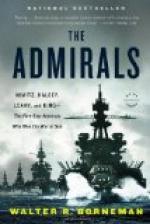They struck us full, rode us down, leaped at the infantry, forced a passage here and there, cut and slashed without mercy, yelling like tigers, “Death to the Huguenots!”
Coligny was wounded, his face bled; I thought he would have fallen from his saddle; but, recovering himself, he called on us to follow him and dashed at the victorious horsemen. Our numbers were few and no help could reach us. We called on our men to stand firm, to fight for the Admiral, to remember their wives and children—it was all in vain.
We were borne along in one struggling, confused mass, horse and foot, royalists and Huguenots all mingled together.
“Anjou! Anjou!” shouted the victors in wild exultation, while the cries of “For the Admiral! For the Faith!” became weaker and weaker. In that part of the field the battle was lost.
We closed around our chief, perhaps a score of us, some even of that number already desperately wounded. No one spoke, but we set our teeth hard, resolving grimly that there should be twenty corpses before Anjou’s victorious troopers reached him.
“We must stop them,” said Coligny, speaking in evident pain, “turn them back, beg them to fight, or the Cause is lost.”
Again and again we endeavoured to make a stand; calling on the fugitives to halt, to remember they were Frenchmen, to look their foes in the face—it was useless, every little group that formed for a moment being swept away by the raging, human torrent.
“Some one must find Count Louis of Nassau,” said our general, “and say I trust to him to cover the retreat. We may yet rally the runaways.”
We looked at each other in doubt. It was not the fear of death that kept us tongue-tied, though death lay in our rear, but each man wished to spend his life for our beloved leader.
“Let three or four of you go,” he said; “one may reach him,” and as he spoke his glance seemed to light on my face.
“I will take the Count your message, my lord!” I cried, and without waiting for a reply turned my horse’s head, and dashed into the whirlpool.
The battle-field was a hideous scene. Wherever the eye could reach, men were fighting and dying. There was no order even among the conquerors. I came across a little knot of Huguenot gentlemen who had turned furiously at bay.
“For the Admiral!” I cried, plunging in wild excitement into the midst of the hostile sworders. “For the Admiral!” Perhaps my comrades thought me mad, and in sober truth they would not have been far wrong; but they were generous souls, and with a yell of defiance they cut their way through after me.
“Count Louis,” I said breathlessly to the first man, as we emerged on the other side, “where is he?”
“I do not know; he was on our right wing when the crash came.”
“I must find him; I have a message from the chief”
“Let us try the right wing,” he said, “they are making a stand there.”




